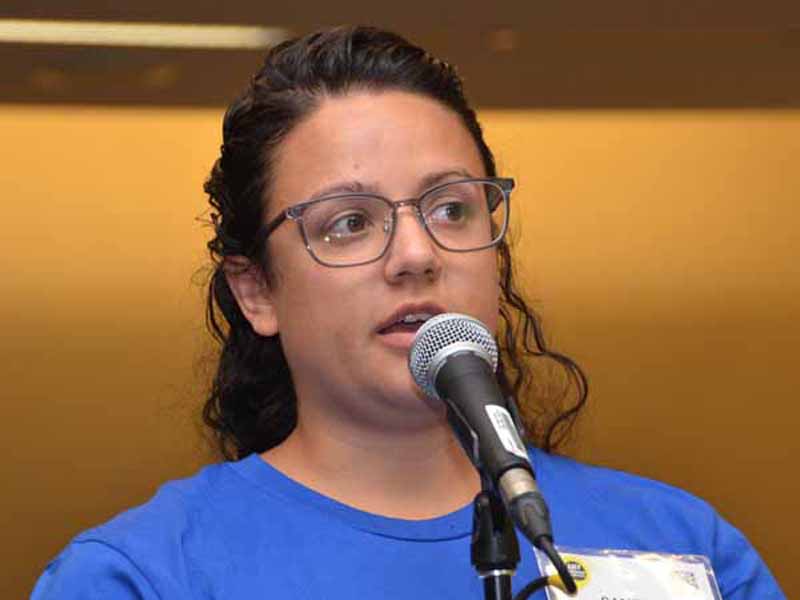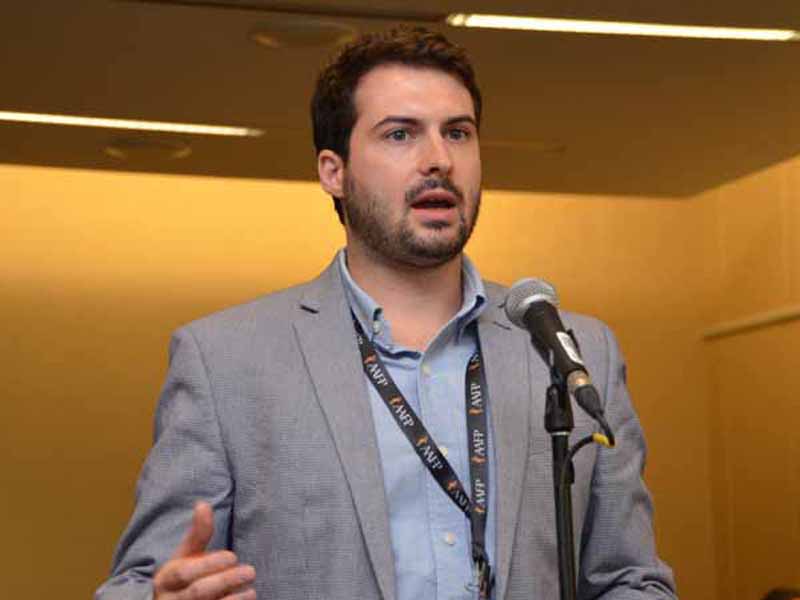Students Focus on Physician Wellness, Additional Training
July 31, 2019 11:18 am Chris Crawford Kansas City, Mo. – During the 2019 National Congress of Student Members held here as part of the July 25-27 AAFP National Conference of Family Medicine Residents and Medical Students, delegates adopted resolutions that addressed protecting physician wellness and requested additional training, among others.
The measures adopted will now move through the AAFP's policymaking channels for review and referral for further action, when appropriate, by Academy leaders.
Protecting Clinician Well-being
Student delegates adopted a handful of resolutions during the July 27 business session that focused on protecting the health and well-being of physicians. One such resolution asked the AAFP to help destigmatize mental illness in physician credentialing and board licensing by, among other things, endorsing an AMA policy(policysearch.ama-assn.org) that encourages state licensing boards to limit mental health disclosure questions to current functional impairment.

According to resolution author Sameena Ahmed-Buehler, a fourth-year student at the University of Minnesota Medical School in Minneapolis, nearly one-third of medical students and residents screen positive for depression; that's two to five times the incidence seen in the general population, she testified during a July 26 reference committee hearing. Yet only about 15% of the physicians-in-training who screen positive for depression seek care for it because of concerns that doing so will adversely affect their credentialing and board licensing prospects. For many of them, she added, this reluctance to disclose their mental health status continues into their careers as practicing physicians.
"Currently, about 70% of the state licensing board applications are in noncompliance with the Americans with Disabilities Act," Ahmed-Buehler said, and the wording of mental health-related questions in those documents needs to change. "The AMA, as well as the Federation of State Medical Boards, are both calling for changes to the wording that currently exists in these policies."
Another measure delegates adopted called on the AAFP to advocate to the Liaison Committee on Medical Education and Commission on Osteopathic College Accreditation that protected breaks be provided for medical students during shifts longer than eight hours, with a minimum of a 30-minute uninterrupted lunch break.
Additionally, this resolution asked the Academy to lobby for one day off in seven and at least eight hours between shifts.
Story Highlights
Resolution author Tisha Van Pelt, a fourth-year student at the University of Florida College of Medicine in Gainesville, said clinical clerkship directors seeking recommendations on appropriate work hours for medical students currently have only the resident duty hour limit -- 80 hours per week averaged over four weeks -- as a point of reference.
"But we are separate and distinct populations and have different levels of training, as well as requirements and responsibilities throughout the day," she said. "So, I do not believe those duty hour work limits are applicable to the student population."
Van Pelt added that in Florida, several medical students have recently committed suicide. "So, having a better work/life balance would be beneficial to medical students," she said.
Finally, delegates adopted a substitute resolution that asked the AAFP to update its member value statement to reflect the organization's commitment to the health and wellness of members using language that explicitly addresses mental and physical health.
Seeking Additional Training
Student congress participants also were hungry for more training on a variety of topics.
First, a resolution that was amended and adopted during the business session called on the Academy to create a CME category that encompasses health care policy, health care economics and health care systems.

The authors wrote that the intent of this resolution is to help facilitate the development of online educational materials and CME lectures for educational platforms such as the student-resident conference, the National Conference of Constituency Leaders and the Family Medicine Experience.
Resolution co-author Christopher Van Hise, a fourth-year medical student at the University of Queensland Ochsner Clinical School in New Orleans, explained in his reference committee testimony that in 2018, the AAFP Congress of Delegates adopted a resolution calling for the inclusion of content on health care systems, economics and financing mechanisms in educational materials and national lectures.
"However, this hasn't been very effective yet, because there is no CME category specifically addressing these topics," he said. "Without this category, there will be fewer policy talks accepted as these topics don't fit well in other categories. Adding this category will increase knowledge amongst family physicians; all of our medical student knowledge comes down from our preceptors."
(It should be noted that in response to that 2018 COD resolution, the AAFP Board of Directors in April adopted the Academy's health care financing primer "Health Care for All: Moving to a Primary Care-Based Health System in the United States.")
Van Hise concluded his testimony by noting that while speaking with some residency program representatives at National Conference, he asked what education they offered on health policy, and many were unsure.
"We are in a unique position as future family physicians to take a role in health care reform," said Van Hise.
Another resolution delegates amended and adopted asked the AAFP to partner with the LCME and Commission on Osteopathic College Accreditation to require medical and osteopathic schools to provide education on health advocacy and health policy to address social determinants of health at the local, state and federal level, with specific standardization milestones that include, but are not limited to,
- providing an overview of SDOH,
- preparing oral testimony and training on how to talk with legislators about this topic, and
- writing an editorial on the issue.
Resolution co-author and fourth-year student Paige Ely, of the Pacific Northwest University of Health Sciences College of Osteopathic Medicine in Yakima, Wash., said the AAFP's 2017 SDOH survey(514 KB PDF) found that 75% of family physicians agreed that they should advocate for public policies that address SDOH, but fewer than 25% had written to or spoken with an elected official.
"In medical school, not everyone is going to become a family physician, but working together to promote the health of our patients and learning how to advocate for patients while we're in medical school would allow us to have that skill by the time we are physicians," she said.
"I think this fits well with the AAFP's mission in creating the interest potentially for more students to enter family medicine and having that introduction to social determinants of health and advocacy," Ely concluded.
Finally, delegates adopted a resolution that tasked the AAFP with creating a toolkit or other resource to educate medical students and residents about basic health insurance framework and other issues related to patient access.
Co-author Collette McWilliams, a second-year student in the James H. Quillen College of Medicine at East Tennessee State University in Johnson City, testified that during her medical school experience, she hasn't received much information about health insurance that would adequately prepare her for future conversations with patients.
"I think it would be super helpful to have a resource published by the AAFP that medical students and residents could reference for education on insurance policies, terminology and the basics, so we could explain these things better to our patients," she said.
Acting on Other Issues
Students also adopted measures that called on the AAFP to
- encourage Congress to support the Resilience Investment, Support and Expansion from Trauma Act;
- support and promote equal evaluation of osteopathic and allopathic undergraduate candidates for residency based on the merits of their application and the needs of the program rather than type of medical school attended;
- adopt a policy that speaks against the use of race as a proxy for biology and genetics in management guidelines and that identifies race as a social construct; and
- offer a preferred gender pronoun option on all AAFP written materials.
Related AAFP News Coverage
2019 National Conference
Students, Residents Elect New Leaders for the Coming Year
(7/27/2019)
More From AAFP
National Conference: Day Three(wakelet.com)